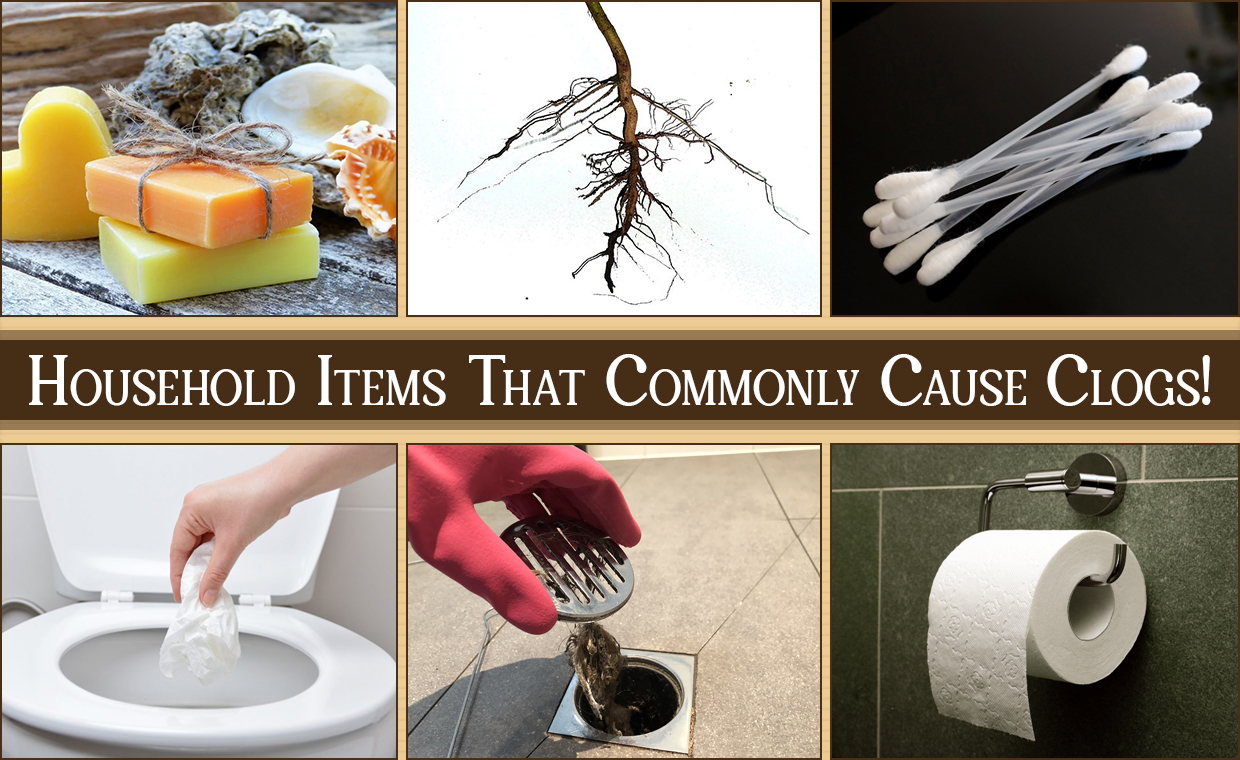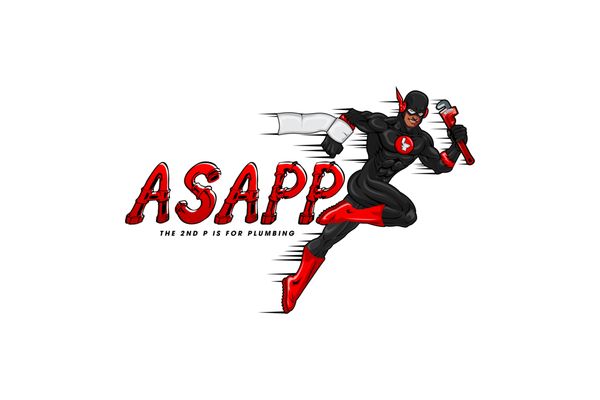
Household items like coffee grounds, grease, and hair often clog your drains because they don’t dissolve or break down easily. When you wash these substances down the drain, they stick to the sides of the pipes, gradually building up and blocking the flow of water. Additionally, solid objects and paper products can cause blockages by absorbing water and expanding, leaving no room for water to flow around them. Even soap scum, which you might think could harmlessly wash away, can combine with other elements to create stubborn clogs. Understanding what causes these clogged drains can help you prevent them and keep your drains clear and flowing freely. Stick around, there’s a lot more to uncover on this topic!
Key Takeaways
- Common household items like hair, food waste, and paper products can clog drains by accumulating and hardening in pipes.
- Soap scum combines with minerals to become a sticky residue that slows water flow and forms blockages with hair and dirt.
- Small objects can cause clogs by accumulating in the drain and exerting pressure that leads to pipe damage.
- Oils and greases solidify and stick to pipe walls, trapping food particles and creating stubborn blockages.
- Regular misuse of paper products, soap, grease, and small items without proper prevention measures leads to persistent clogs.
Understanding Drain Clogs
Let’s explore understanding what exactly causes drain clogs in your home, so you’re better equipped to prevent them. At the heart of the issue, we find a simple concept: anything that doesn’t dissolve or pass through the pipes easily can cause a blockage. It’s a broad category and includes a myriad of everyday items.
You might be surprised to learn that even seemingly harmless substances like coffee grounds and grease can cause drain clogs. They stick to the sides of the pipes, gradually building up over time and reducing the flow of water. Similarly, small food particles, if not properly caught by a sink strainer, can accumulate and create a clog.
It’s not just kitchen sinks that are susceptible. Bathroom drains can easily get blocked by soap scum and toothpaste. These products, while designed to dissolve in water, can cling to the sides of pipes and harden over time.
If you’re disposing of these items down your drains, it’s time to rethink your habits. Prevention is key, and by recognizing these common culprits, you’ll be one step closer to keeping your drains free-flowing.
Hair: The Number One Offender
Without a doubt, hair is the biggest offender when it comes to clogged drains, particularly in the bathroom. You might not realize it, but every time you wash your hair, countless strands go down the drain, leading to the mother of all clogs. Let’s look at why this happens and how you can prevent it.
- Shedding: You naturally lose hundreds of hair strands per day, and they often get washed down the drain.
- Adhesive Nature: Hair has a sticky quality when wet, clumping together and sticking to pipe walls, gradually causing blockages.
- Interaction with Other Substances: Hair can bond with soap, grease, and other substances, forming a dense, hard-to-remove mass.
- Slow Decay: Unlike many organic substances, hair decomposes very slowly, leading to long-term clogs if not removed promptly.
To prevent hair from clogging your drains, consider using a hair catcher in your shower and sink. Regularly clean these catchers to keep them effective. Brushing your hair before washing can also reduce the amount of hair that goes down the drain. Remember, it’s easier to prevent a clog than to deal with one.
Food Waste and Drain Blockages
Your kitchen sink’s most likely enemy is food waste, which can create stubborn blockages in your drains. You may think it’s harmless to toss small bits of leftovers, coffee grounds, or eggshells down the sink, but over time, these can accumulate and gum up your pipes.
The problem with food waste is that it doesn’t dissolve like some other substances. It sits in your pipes, hardens, and then starts to trap other debris. This doesn’t just cause inconvenient clogs, it can even lead to more serious plumbing issues.
You might be tempted to rely on your garbage disposal to handle food waste. But beware, these devices aren’t designed to process everything. Hard items like bones or fibrous materials like corn husks can damage your disposal and still end up causing blockages.
The Problem With Paper Products
Flushing paper products down your drains might seem like a quick disposal solution, but it’s actually creating serious clogging issues. Now, you’re probably wondering, “How can something as thin and light as paper cause such a mess?” Surprisingly, it’s not about the size or weight, but how these items interact with water and your pipes.
Here are four key reasons why paper products are a problem:
- Absorption: Unlike human waste and toilet paper, most paper products aren’t designed to break down in water. They absorb it instead and expand, blocking the flow.
- Strength: Paper towels, napkins, and even facial tissues are stronger than toilet paper. They don’t disintegrate as quickly, which leads to buildup.
- Quantity: It’s easy to use more paper products than necessary, especially when cleaning or wiping up spills. This excess can bulk up in the pipes.
- Non-Biodegradable Elements: Some paper products contain elements like plastic linings that don’t degrade, adding to the clog.
Effects of Soap Scum Build-Up
Just as paper products can wreak havoc on your plumbing, soap scum is another seemingly innocent culprit that’s silently sabotaging your drains. When you bathe or wash your hands, the soap combines with minerals in the water to form a hard, sticky residue known as soap scum. Over time, this substance accumulates and can severely impact your drains’ efficiency.
It might seem harmless at first, but soap scum build-up can lead to serious issues. If left untreated, it can slowly block your pipes, causing water to drain more slowly. You’ve probably noticed this when your shower starts to pool or your sink takes longer to empty. That’s your first clue that soap scum is starting to take over.
Moreover, soap scum is a magnet for hair, dirt, and other debris. These elements bind with the soap scum, creating a sticky mass that’s even harder to dislodge. This build-up not only slows your water flow but can also result in costly plumbing repairs. So, while soap might clean you, its remnants can dirty your drains and create issues you’d rather avoid.
How Small Objects Cause Big Issues
Surprisingly, even the tiniest objects can cause serious plumbing problems when they accidentally slip down your drains. You might think nothing of a hairpin falling into the sink, or a small toy disappearing down the bathtub drain, but these small inconveniences can lead to big issues.
Here’s how small objects can wreak havoc on your plumbing system:
- Blockage: Small objects can accumulate over time, causing a blockage that prevents water from flowing freely.
- Pipe Damage: Sometimes, these objects can get lodged in a certain spot, causing pressure that can lead to pipe damage.
- Expensive Repairs: If a blockage or pipe damage occurs, you’re looking at potentially costly repairs or replacements.
- Environmental Impact: If left untreated, these blockages can lead to overflows and leaks, which can harm the environment.
Damaging Impact of Grease and Oil
While small objects can certainly disrupt your plumbing, pouring grease and oil down your drain is an equally damaging habit. You may not think twice about washing cooking oil, bacon grease, or other fatty substances down the sink, but they can cause severe problems.
At first, grease and oil seem harmless as they’re in liquid form. However, as they cool down, they solidify, sticking to the sides of your pipes. Over time, these deposits build up, narrowing the drain and reducing water flow. As a result, you’ll notice that your sink drains slower than usual.
Furthermore, this greasy buildup can trap food particles and other small objects, creating a dense, stubborn blockage. If left untreated, this can lead to a complete clog, making your drain virtually unusable.
The consequences aren’t just a nuisance; they’re costly too. You’ll need to hire a plumber to clear the drain, which can be expensive, not to mention the potential damage to your pipes. So, remember, grease and oil might be out of sight once washed down the sink, but they certainly shouldn’t be out of mind.
Preventing Household Drain Clogs
To keep your drains free-flowing and avoid costly repairs, it’s essential to adopt some preventive measures in your daily routine. This isn’t just about being mindful of what goes down the drain, but also includes regular cleaning and maintenance.
Here’s a simple 4-step guide to help you prevent household drain clogs:
- Mind What Goes Down: Be cautious about what you’re disposing of in your sinks. Avoid pouring grease or oil down the drain, and don’t flush items like wipes, cotton balls, or sanitary products down the toilet.
- Use Drain Screens: Drain screens are an inexpensive way to catch debris that could potentially clog your drains. They’re especially useful in the kitchen and bathroom sinks.
- Implement Regular Cleaning: Make it a habit to clean your drains regularly. You can use a mixture of vinegar and baking soda to naturally break up any potential clogs.
- Run Hot Water: After each use, run hot water down the drain to help dissolve and wash away any residual substances.
Seeking Professional Help for Clogs
Sometimes, despite your best efforts, you’ll find that a stubborn clog just won’t budge, and that’s when it’s time to call in a professional plumber. You might be thinking, ‘I can handle this myself,’ but there are times when a DIY approach won’t suffice. Serious clogs can lead to worse problems if not managed properly.
Professional plumbers have the right tools and know-how to tackle even the most stubborn clogs. They can accurately identify the root cause and location of the clog, something you might struggle with. They’re equipped with specialized drain snakes and hydro-jetting equipment that can power through the toughest blockages.
It’s not just about clearing the clog. A professional will also inspect your pipes for any damage. They’ll verify that your drainage system is in good shape to prevent future clogs. So, don’t hesitate to call the pros when you’re faced with a persistent clog. It’s not admitting defeat; it’s about taking care of your home. Remember, it’s better to pay for a professional’s help now than to deal with costly repairs later.
Conclusion
So, you’ve identified the usual suspects: hair, food waste, paper products, soap scum, small objects, and grease. They are all responsible for clogging your drains. But worry not! By adopting a few vigilance measures and good habits, you can stop these common household items from creating obstructions. And don’t wait for a minor clog to become a major headache (and expense)! ASAP Plumbing, Birmingham’s trusted source for fast, reliable, and affordable plumbing services in Birmingham, is here to help. We’re available for same-day service, ensuring you get back to your normal routine as quickly as possible. If you’re dealing with a stubborn clog, don’t hesitate to call us at (205) 569-6360 or contact us online to schedule an appointment. We’ve got the tools and expertise to restore the free flow of your drains! Experience the ASAP Plumbing difference today!

